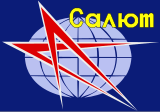 | |
| Station statistics | |
|---|---|
| COSPAR ID | 1974-046A |
| SATCAT no. | 7342 |
| Call sign | Salyut 3 |
| Crew | 2 |
| Launch | 25 June 1974 04:15:00 UTC[1] |
| Launch pad | LC-81/23, Baikonur Cosmodrome, Soviet Union[1] |
| Reentry | 24 January 1975 |
| Mass | 18,900 kg (at launch)[2] |
| Length | 14.55 m[2] |
| Width | 4.15 m (maximum diameter)[2] |
| Pressurised volume | 90 m³[2] |
| Periapsis altitude | 219 kilometres (136 mi) (initial orbit)[3] |
| Apoapsis altitude | 270 kilometres (170 mi) (initial orbit)[3] |
| Orbital inclination | 51.6 degrees[4] |
| Orbital period | 89.1 minutes[4] |
| Days in orbit | 213 days |
| Days occupied | 15 days |
| Statistics as of de-orbit and reentry | |
| Configuration | |
 Salyut 3 diagram | |
Salyut 3 (Russian: Салют-3; English: Salute 3; also known as OPS-2[1] or Almaz 2[2]) was a Soviet space station launched on 25 June 1974. It was the second Almaz military space station, and the first such station to be launched successfully.[2] It was included in the Salyut program to disguise its true military nature.[5] Due to the military nature of the station, the Soviet Union was reluctant to release information about its design, and about the missions relating to the station.[6]
It attained an altitude of 219 to 270 km on launch[3] and NASA reported its final orbital altitude was 268 to 272 km.[7] Only one of the three intended crews successfully boarded and operated the station, brought by Soyuz 14; Soyuz 15 attempted to bring a second crew but failed to dock.
Although little official information has been released about the station, several sources report that it contained multiple Earth-observation cameras, as well as an on-board gun. The station was deorbited and re-entered the atmosphere on 24 January 1975. The next space station launched by the Soviet Union was the civilian station Salyut 4; the next military station was Salyut 5, which was the final Almaz space station.